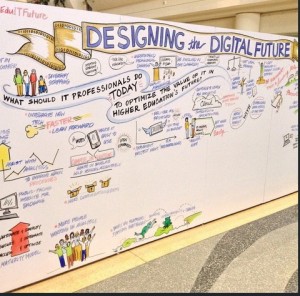We heard from Kyle Courtney yesterday (Oct 22, 2014) about “Fair Use and Copyright in the Digital Era”. Kyle is a terrific and engaging speaker. I had spoken to him earlier when I had questions regarding the use of copyrighted material in MOOCs.
Bottom line – there are no simple answers and use your discretion in interpreting a complex set of laws based on your risk tolerance. As we have seen in the Georgia State University e-reserves case (Cambridge University Press et al v Patton et al), even the courts can’t seem to decide one way or the other! For all the resources related to this case, click here.
The core issue is that faculty rely on content created by many others for their teaching. The content comes from a variety of sources and from all over the world. Copyright laws provide the general framework for the appropriate use of the content, however, there are considerable variations from one country to the other. Copyright protection is in effect the moment content is created and stays with the author. Duration of the copyright is pretty complex subject matter and you can read more about it here. When an author publishes content, generally, they transfer the copyright to the publisher. This results in enormous inconveniences for the use of published work including the fact that for certain uses of the published work, the original author himself/herself need to seek publisher’s permission. Open access policy is beginning to address this issue somewhat in case of scholarly articles. According to this, the author exercises his/her rights to the content in addition to granting rights to the publisher.
As always, technology is ahead of policies and this issue is not an exception. The explosion in born digital content and the use of digital materials in teaching, learning and research has brought to light the lack of clarity of current copyright laws which are still catching up.

 After a brief visit to
After a brief visit to